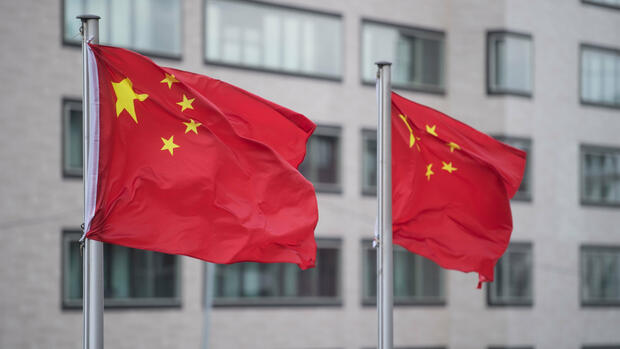EU companies find it more difficult to do business in the People’s Republic.
(Photo: dpa)
Beijing European companies rate the business environment in China as badly as it has in two decades. In addition to the clouded growth prospects, they complain above all about the increasing political hurdles. This is the result of a survey by the European Chamber of Commerce in China published on Wednesday.
Even after the end of the corona restrictions, around two thirds of the 570 participating companies are more pessimistic about their business prospects than in the previous year. More than one in ten companies said they had withdrawn investments from China.
The companies thought carefully “how many eggs they want to keep in their China basket,” said Jens Eskelund, the new president of the EU chamber in China. At the end of May, the Dane replaced the German Jörg Wuttke at the head of the representation of European companies in the People’s Republic.
A large-scale withdrawal from China has not yet been determined, Eskelund clarifies. But the direction in which Europe’s firms are moving should be a concern for China’s leaders. The majority of the companies surveyed do not plan to expand their investments in the People’s Republic this year. “These investments probably won’t come back anytime soon,” he said.
The main reasons for the growing uncertainty of EU companies are the bumpy economic recovery of the world’s second largest economy and the subdued outlook for the global economy. According to official figures, the Chinese economy grew by 4.5 percent in the first quarter. Recently, however, there have been increasing indications that growth is weakening.
Companies are complaining about the increasing politicization of business in China
The EU companies also complain about an increasing politicization of the China business. Almost two-thirds of companies said they lost business because of regulatory hurdles or restrictions on market access. In the field of medical technology, for example, Chinese companies are systematically preferred. The majority of companies do not expect any improvement in the next five years.
The strict zero-Covid policy caused major economic upheavals worldwide last year. Since the opening in December, the Chinese government has been campaigning massively for investments from foreign companies.
This also became clear during the German-Chinese government consultations at the beginning of the week. China’s Premier Li Qiang also met with the CEOs of German companies, including BASF, BMW, Mercedes and Volkswagen. The latter have regularly been among the largest foreign investors in the People’s Republic over the past five years.
>> Read also: German-Chinese attempts at rapprochement – with a double risk
It is perfectly fine for representatives of the state to travel to Europe, “but what we need is not just talk, but clear and strong measures to support the local economy,” demands Carlo D’Andrea, who heads the EU chamber in Shanghai directs. European companies in China are currently receiving mixed signals from the Chinese government. On the one hand foreign companies are being courted, on the other hand there is a strong focus on self-sufficiency and national security.
Chamber boss Eskelund referred to the tightened anti-espionage law, which is to come into force in July. So far, most EU companies have assumed that they will not be affected. However, it increases uncertainty as to the direction in which national security legislation will develop. Many awaited the message from the November plenum of the Communist Party Central Committee. It is expected that the guidelines for the future economic course will be set there.
The growing uncertainty is also changing supply relationships. Three out of four EU companies in China have also realigned their supply chains in the past two years. In doing so, they were reacting to the consequences of the repeated corona lockdowns last year, but also to the growing political risks.
Two trends can be observed: greater localization and broader geographical diversification. Eskelund emphasizes that there is a measurable tendency “to create separate value chains”. However, the relocation of supply chains out of China does not automatically mean a reduction in risk. In many cases, the components still come from the People’s Republic, only the final assembly takes place in another country.
More: German companies in China want to invest more – despite the gloomy business prospects
